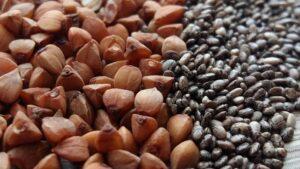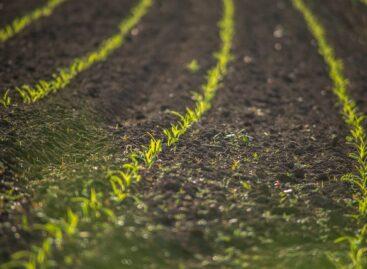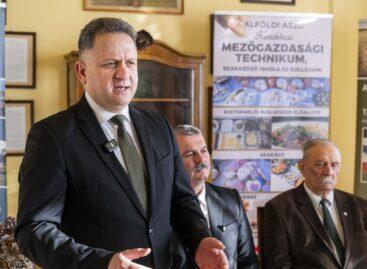It’s not worth saving on the metal-sealed seed!
The actors of the domestic seed sector expect a decrease in the use of metal-sealed seeds. The reason behind this is the deterioration of farmers’ liquidity situation, however, the National Chamber of Agrarian Economy and the Seed Association Trade Organization and Product Council do not recommend that farmers save on this cost: in the case of the purchase of metal-sealed seed, a species of known and reliable origin that has been tracked by the authorities – and the high-quality raw material of the same variety, free of pollutants and weed seeds, and with high germination capacity can be used as a basis for the production of quality goods.

(Photo: Pixabay)
A sought-after export product is high-quality Hungarian seed. The amount of domestic seed production is around 310,000 tons per year. The country is also a regional production and logistics center, which means that the seed material arriving in our country is conditioned, packaged, and metal sealed here. In 2022, the sector metal-sealed 356,000 tons of seed (this includes the reclassification of seed produced the previous year but in storage), of which 210,000 tons went to export markets. This is a ratio of around 60 percent, which indicates that the seed sector is highly export-oriented.
Previously, we exported a significant amount of corn seed to Russia and Ukraine
Since the outbreak of the war, exports have plummeted, and our shipments to this region have decreased by about one million bags. The European Union thus became the biggest market for corn seed. Since the development of feed corn prices is not favorable for producers, no increase in the area sown in the EU member states is expected, and even a decrease can be expected, which also predicts a decline in the amount of seed used. Sunflower seeds are mainly sent to the European Union and countries outside the EU, and to a small extent Hungarian seeds are also sent to some Asian countries. In the case of autumn cabbage rape, the foreign market interest is much wider, Hungarian seed is also in demand in Australia, Chile and Turkey.
In recent decades, the size of the area used for seed production has fallen significantly
While in the 1980s the cultivated area was close to 350,000 hectares, nowadays farmers grow seeds on an area smaller than 120,000 hectares. According to the overview of the National Chamber of Agriculture (NAK) and the Seed Association Interprofessional Organization and Product Council (VSZT), the area ratio of corn seeds shows a decreasing trend between 2018-22, that of autumn cabbage fell to a fifth, while that of corn, spring barley and peas its seed production area essentially stagnated, and sugar beet seed production ceased. A small increase can be seen in the case of sunflowers and winter barley, among the protein crops, the area of soybeans and alfalfa shows a significant change from year to year, and currently there is an increase in this segment.
At the same time, thanks to the technological development of the sector and the effectiveness of breeding work, the yield per hectare has increased significantly
The global economic and political changes of recent years have also had an impact on the seed market. The informative price published annually by VSZT has essentially shown a steady rise since 2013. In the uncertain economic environment resulting from the Ukrainian-Russian conflict, as well as skyrocketing input costs – mainly energy prices – the price of seed doubled last year. Although the negative effects of these processes continued this year, the information price of metal-sealed seed was lower this year than last year, especially in the case of autumn barley and triticale. Unfortunately, all of this also affects farmers’ willingness to buy seeds. According to the experience of seed production enterprises, the use of metal-sealed seeds among arable plant growers is significantly reduced. There are many factors behind this: the extremely severe drought of 2022, as well as the resulting loss of income, the low purchase price of crops, and the still high cost of inputs led to liquidity problems for producers. That is why many people want to save on seeds. However, according to NAK and VSZT, it is not certain that producers will do well with it. Although the price of seed is raised by farmers, let’s not forget that it is only 8-10 percent of the total cost of cultivation. However, in the case of purchasing metal-sealed seeds, high-quality raw materials of known and reliable origin, of the same species and variety, free from pollutants and weed seeds, and with high germination potential can be established.
In the domestic seed sector, all forms of business can be found, currently 811 small and large companies and 376 individuals are engaged in seed production in the country
The players in the sector produce extremely high-value propagating material; in addition to providing the raw material for the food of the future, they create the first milestone of food safety by ensuring the original germination of the seeds. Every year, the National Chamber of Agriculture, the National Association of Grain Growers and the Seed Association help farmers with objective variety test results. The basic purpose of the experiments is to provide usable, objective information for the producers, thereby helping the selection of varieties. It is also possible to compare the results of variety experiments covering the entire country in areas with different characteristics, which is an excellent source of information for farmers with different ecological conditions. The organizers published the results of the post-registration variety trials of the national winter wheat and winter cabbage rape in 2023 in summary publications for those interested.
NAK
Related news
CBAM causes market disruption
🎧 Hallgasd a cikket: Lejátszás Szünet Folytatás Leállítás Nyelv: Auto…
Read more >Agricultural vocational training also places great emphasis on irrigation development
🎧 Hallgasd a cikket: Lejátszás Szünet Folytatás Leállítás Nyelv: Auto…
Read more >Related news
Nestlé to sell remaining ice-cream assets but commits to Froneri venture
🎧 Hallgasd a cikket: Lejátszás Szünet Folytatás Leállítás Nyelv: Auto…
Read more >40 secure jobs, sustainable solutions – new BURGER KING® in Csepel
🎧 Hallgasd a cikket: Lejátszás Szünet Folytatás Leállítás Nyelv: Auto…
Read more >







